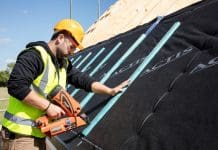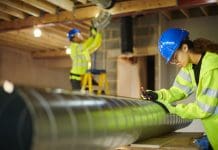UK government fire-safe cladding funds should be the catalyst for change in construction, argue software specialists
Four years ago, very few people had heard of Grenfell Tower in London. But the events of 14 June 2017 will be etched in our hearts and minds forever. Seventy-two people lost their lives in a tragic fire that was started by a faulty fridge-freezer, but made much more devastating by the combustible cladding that covered the building’s exterior.
Now, a new UK government funding initiative is finally compelling property owners to invest in fire-safe cladding on high-rise buildings. But reducing this risk is just the start point.
To prevent another Grenfell disaster and make health and safety a long-term priority, the construction industry needs greater accountability and traceability for every material used in the creation of commercial buildings. And Elecosoft is helping companies to achieve this using best practice from leading sectors.
Cultural transformation is needed in construction
A catastrophe like Grenfell should never have happened – and it most certainly should never happen again. Residential development companies have a duty of care to set rigorous health and safety standards, and any materials found to be subpar must be removed from the property immediately.
Deep cultural change is needed within the construction industry to make sure this approach becomes “the norm”. A 2018 fire safety standards review, led by Dame Judith Hackitt, called for a new regulatory framework to be introduced for buildings more than 10 storeys high, and more effective product testing.
But despite these recommendations, it wasn’t until 2021 that the housing secretary revealed a £5bn government investment to fund the cost of replacing unsafe cladding as part of a new Fire Safety Bill.
In light of this grant, commercial property owners, developers and construction firms are now faced with the huge task of identifying at-risk buildings, planning replacement work and keeping costs within the available funding limit. How can this be achieved?
A lesson from retail and hospitality
Retail and hospitality have been creating a common data environment for decades using specs and standards software such as IconSystem, to enable consistency across their property footprint. These sectors understand the value of building up a corporate “memory bank”; cataloguing every component used in the construction process so that damaged materials can be replaced like-for-like, and all new developments honour the brand’s core values.
Expanding this approach across the construction industry would allow developers and property owners to track fire safety measures across their portfolio and put long-term processes in place for monitoring and resolving material issues.
Safety starts with accountability
Without a central software in place, it’s difficult for any party to take ownership of fire safety. We need greater accountability; a way to digitally capture all material decisions and share this detail with all stakeholders.
Without a common data environment, there are too many opportunities for critical data to slip through the cracks. Construction companies aren’t always given specific instructions by developers or property owners, and they’re under no obligation to report their choice of materials back to the customer.
The impact of this knowledge gap was shown at Grenfell Tower, with devastating consequences. Following the tragedy, research by the University of Reading found that emergency services used water to treat the fire, which caused a violent chemical reaction between the building’s aluminium cladding and insulating foam, spreading the flames.
If information relating to Grenfell’s cladding composition had been available online via the cloud, the building’s owner could have shared this with firefighters, to help them take a safer course of action. Corporate memory is quite literally life-changing.
Sharing best practice
Greater accountability is the first step towards higher fire safety standards, but even with the best intentions, errors sometimes happen. Developers and construction companies make material choices in good faith, which meet guidelines at the time of the project but are later found to need upgrading or replacing.
In the case of Grenfell Tower, government funding only solves part of the problem. Property owners may have no detailed record of the materials used across their portfolio – so determining which buildings require new cladding becomes costly and time-consuming.
Committing to digital software will stop situations like this from happening in future. Rather than corporate memory being stored in people’s heads, it will be captured through cloud-based software that can be accessed by relevant stakeholders and best practice can be shared for complete fire safety compliance.
Delivering cultural change
There’s a huge amount of responsibility on the construction industry to enhance high-rise health and safety, and while government funding might ease the financial cost, it won’t necessarily foot the final bill. But you can’t put a price on people’s lives – so we need to learn lessons from Grenfell Tower and put systems in place to prevent future crises.
Improving corporate memory and using digital software to store material information will strengthen relationships between property developers, construction companies and building owners to make sure fire safety standards are higher than ever.
The Hackitt review specifically mentioned the need to create digital records to improve the construction industry’s fire safety performance. Today, detailed material information either doesn’t exist within most property groups, or it isn’t held centrally in a way that’s easily accessible.
Investing in specs and standards software is a simple, effective way to create a formal corporate memory of how every high-rise is built, which can be easily accessed in a worst-case scenario. Nobody wants to see another disaster like Grenfell; digital software can deliver the traceability and accountability needed to enable cultural change.
IconSystem by Elecosoft is Building Information Management software with an integrated specs and standards feature for controlling and managing standards. Join our webinar to find out more.
Elecosoft
Tel: +44 (0) 1844 261700
Twitter: @elecosoft
Please note: this is a commercial profile.














